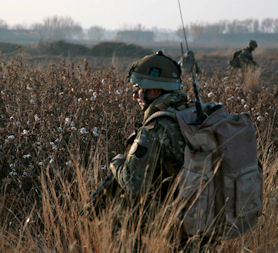Afghanistan: the relentless search for hidden bombs
Captain Doug Beattie writes from the Afghan frontline on the relentless search for IEDs and recounts the courage of those whose job is to unearth the hidden bombs.

Captain Doug Beattie of 1 Royal Irish Regiment won the Military Cross for bravery in Afghanistan. He writes exclusively for Channel 4 News on his return to the frontline.
“A giant of a man.”
These are the words used by Colonel Bob Seddon, the former commanding officer of Staff Sgt Olaf Schmid, to describe the bomb disposal expert killed in Sangin whose inquest has recently been held.
It is a fitting tribute to a fiercely brave man.
But for every one or two Improvised Explosive Devices – so called roadside bombs – found by specialist high risk teams several more are unearthed by the skill and concentration of the ordinary soldier.
IED discovery
Such was the case in January when Ranger Gavin Edgar found one of the deadly devices and a haul of other IED making equipment while on patrol in Saidabad. “I slowly pulled the top of the hay away, saw the pressure plate and couldn’t believe my eyes! I’m delighted but I was just doing my job at the end of the day”, said the 19-year-old from Ballymoney, Northern Ireland.
And the skill with which he does his job accounted for a device capable of killing him, his colleagues and innocent civilians. With the device was the component parts to make a further 10 devices.
It is statements like that which underlies the real courage of these men as they go about their work trying to make Nad-e-Ali a better place for the people of Helmand.
The young rangers of 1 Royal Irish (1 R IRISH) step forward day in, day out knowing each step could be their last.
Amongst their number will be those armed with metal detectors, scanning the ground ahead of them. But often the detector will offer only psychological comfort because – as with the device which accounted for Olaf Schmid – the bombs the enemy plant are increasingly sophisticated and decreasingly reliant on metal components to make them work.
We do have another weapon in our armory though, the mark one eyeball.
Inching forward soldiers will scrutinise the ground at their feet looking for the tell-tale signs of enemy activity: disturbed earth, patches of raised ground, soil a slightly different colour to that which surrounds it.
But the task is exacting. It allows for no breaks, no distraction. A moment’s lack of focus can result in broken bodies and shattered lives.
There is also the peril of tunnel-vision. With so much attention centred on the hazard below there is always the risk that another Taliban threat – an ambush, suicide bomber – goes unnoticed until it is too late.
Relentless searching
So far the combined brains of those working in the arms industry have failed to develop what would perhaps be the most useful battlefield weapon of all – eyes in the back of your head.
Until that happens, the imprecise act of warfare goes on, with British troops – hour by hour, minute by minute – making judgement calls on where the biggest and most immediate dangers actually lie.
Most of the time we get it right and complete another patrol unscathed. But not always.
And that is when another miserable train of events is set in motion: the loss of a man, the repatriation of a body, the inquest into a violent death.
As my Commanding Officer Lieutenant Colonel Colin Weir MBE said of Ranger Edgar: “The IED threat in this area has been significant. We have lost life and limb to IEDs. Ranger Edgar’s professionalism has without doubt saved lives. A good morning’s work!”
It is continuous, relentless, it saps the rangers energy little by little. It is both physically and mentally demanding and it drives your actions every minute of every day, every step, every turn of the wheel. But it is just about doing my job at the end of the day.
Captain Doug Beattie MC of 1 Royal Irish Regiment is currently deployed in Southern Afghanistan. He is the author of An Ordinary Soldier and Task Force Helmand. Pictures provided by R IRISH media ops. View more here.